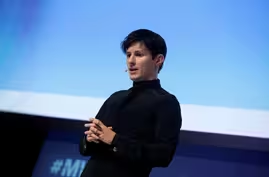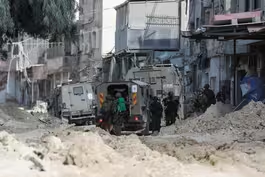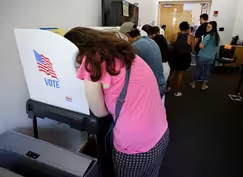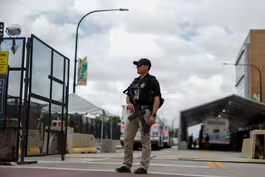
What's behind the recent surge in mosquito-borne illnesses
Clip: 8/29/2024 | 6m 52sVideo has Closed Captions
What's behind the recent surge in mosquito-borne illnesses
Parts of New England are on high alert after health officials in New Hampshire confirmed the first death from the rare, mosquito-borne virus known as eastern equine encephalitis. Another illness transmitted by mosquitoes, West Nile Virus, paralyzed a teenager in Missouri and hospitalized Dr. Anthony Fauci. Geoff Bennett discussed the risks with Dr. Peter Hotez of Baylor College of Medicine.
Problems playing video? | Closed Captioning Feedback
Problems playing video? | Closed Captioning Feedback
Major corporate funding for the PBS News Hour is provided by BDO, BNSF, Consumer Cellular, American Cruise Lines, and Raymond James. Funding for the PBS NewsHour Weekend is provided by...

What's behind the recent surge in mosquito-borne illnesses
Clip: 8/29/2024 | 6m 52sVideo has Closed Captions
Parts of New England are on high alert after health officials in New Hampshire confirmed the first death from the rare, mosquito-borne virus known as eastern equine encephalitis. Another illness transmitted by mosquitoes, West Nile Virus, paralyzed a teenager in Missouri and hospitalized Dr. Anthony Fauci. Geoff Bennett discussed the risks with Dr. Peter Hotez of Baylor College of Medicine.
Problems playing video? | Closed Captioning Feedback
How to Watch PBS News Hour
PBS News Hour is available to stream on pbs.org and the free PBS App, available on iPhone, Apple TV, Android TV, Android smartphones, Amazon Fire TV, Amazon Fire Tablet, Roku, Samsung Smart TV, and Vizio.
Providing Support for PBS.org
Learn Moreabout PBS online sponsorshipGEOFF BENNETT: Parts of New England are# on high alert after health officials in## New Hampshire this week confirmed the first death## from the rare mosquito-borne virus# known as eastern equine encephalitis.
It brings the total number of confirmed human# infections in the U.S. this year to six,## including cases in Wisconsin, New Jersey# and the neighboring states of Vermont and## Massachusetts.
Meantime, hundreds of# cases of another illness transmitted## by mosquitoes -- that's West Nile virus# -- have been confirmed across 33 states.
It paralyzed a teenager in Missouri# and hospitalized Dr. Anthony Fauci.## The country's former top infectious# disease expert told the outlet STAT:## "I have never been as sick in my life."
To help us understand more about these viruses,## the risks they pose and how they spread,# we're joined now by Dr. Peter Hotez,## dean of the National School of Tropical# Medicine at Baylor College of Medicine.
Welcome back to the "News Hour."
DR. PETER HOTEZ, Baylor College of# Medicine: Thanks for having me, Geoff.
GEOFF BENNETT: We have now seen the first death# from the eastern equine encephalitis v.. Tell us more about this disease, how it spreads,# and why New England seems to be affected by it.
DR. PETER HOTEZ: Yes, it's called an alphavirus.
And we do see cases periodically, including# human cases and deaths.
And it tends .. disproportionately affect horses.
And that's# where the equine part comes into the name.## It circulates among birds.
And there's a# specific mosquito for the birds.
And then,## once it gets hold in the birds, different# mosquitoes can bite and transmit to humans.
So we don't usually see a lot of# cases.
I think my big concern is,## we're starting to see not only the eastern# equine cases, but, as you mentioned,## the West Nile virus cases.
And there's a bigger# problem going on in the Western Hemisphere,## where there's this big uptick in dengue# cases in Brazil, this other virus Oropouche.
We're seeing an expansion of yellow fever,# geography in Brazil to the fringes of the## Amazon.
So the big picture, I think, is that# we're seeing a general surge in vector-borne## diseases across the hemisphere.
Brazil and# parts of the Caribbean are ground zero,## but it's starting to filter in,# particularly in Texas and the Gulf Coast.
And this is -- could be a new normal for# us during this time of climate change,## together with urbanization and other factors.
GEOFF BENNETT: Well, in parts of Massachusetts,# health officials there are telling people to## avoid outdoor activity between dusk and# dawn.
They're conducting pesticide sprays.
How concerned should folks in that region be# and what more can they do to protect themselves?
DR. PETER HOTEZ: Well, the problem is, there's# not much room for error.
This is -- has a high## percentage of encephalitis and fatalities,# perhaps as high as 30 percent of the cases.
So this is definitely not one you want to# get.
I think the most important thing is,## if you do go outside, especially early# in the morning or in the evening,## you want to be fully covered with# long pants or sweatpants and socks## and sneakers and a hooded sweatshirt# if you're out in the morning and a hat.
And then, on the exposed parts, make# certain you use a good insect repellent,## preferably one with a high percentage# of DEET that you put on the dorsal and## palm or surface of your hands# and around your neck.
I mean,## that's what I do.
I like to get my 10,000# steps in and I do walks early in the morning,## sometimes before sunrise and in the evening, which# is a maximal time when mosquitoes are biting.
And, sometimes, my neighbors who are out in# shorts and T-shirts will look at me like I'm## a bit nuts.
And I use that as a teachable moment.# And I will explain to them, look, you have to be## really careful because West Nile is accelerating# right now, as well as other vector-borne diseases.## And there's risk now for ones transmitted by# the Aedes aegypti mosquito, including dengue.
And also we have ones that are arising# from Brazil.
So this is the peak time of## year for vector-borne disease, and it's# probably going to become our new normal.
GEOFF BENNETT: You mentioned West# Nile.
Let's talk more about it,## because we have seen nearly 300 cases across## the country.
What should we know about the# spread and severity of the West Nile virus?
DR. PETER HOTEZ: Well, Texas is getting# hit very hard.
So what we usually see in## the United States is a big peak in Texas# and the adjoining states in the southeast,## Mississippi and Louisiana, and then# going up into the Great Plains.
And there's North Dakota and Nebraska.# And then you also sometimes see foci in## New York and New Jersey, where the virus was# first discovered.
You have bad years and good## years for reasons that we don't entirely# understand.
2012 was a terrible year,## for instance.
And this one's looking like# it could be a pretty bad year as well.
And I'm worried that it's going# to become more and more like this,## that every year is going to become a# bad West Nile year, just like we could## see dengue coming into the U.S. Gulf Coast and# other diseases transmitted by Aedes mosquitoes.
So the West Nile is transmitted by the Culex# mosquitoes.
That's why we do insecticidal## spraying in the evening and the morning.
Aedes is# a little more difficult to control.
It requires## going house to house.
And we tend not# to do that much in the United States.
GEOFF BENNETT: Well, if this is the new normal,## mosquito-borne illness made worse by climate change, what more should we be doing to protect ourselves?
What# more could the federal government do?
DR. PETER HOTEZ: Yes, it's a good question.
I think we need to up our game in terms of doin.. our surveillance system in the U.S. is# extremely fragmented.
So, for instance,## if a patient comes into an emergency# room or a clinic and has what kind of## looks like it could be an arbovirus infection, a# mosquito-transmitted virus infection, they will## present with fever and rash and headache# and photophobia, being afraid of the light.
And the physician kind of shrugs his shoulders# and say, hmm, maybe it's an arbovirus infection,## maybe it's something else.
And by# the time you get the test back,## it stays later and sometimes even longer than that# because you have to send it to specialty labs.
So we don't have the point-of-care diagnostics# that we need.
And what we really need to do is## have a detailed map at a county-by-county# level of what's in our particular county.
And so one of the things that we're doing here# at Baylor College of Medicine and our National## School of Tropical Medicine, we're undertaking a# pretty sophisticated metagenomics project where## we're doing full sequencing of mosquitoes,# the full genome together with their viruses,## and also pairing it with wastewater testing, so# we can get that very detailed map of what's there,## so when a physician sees a patient that they# suspect could have one of these infections,## they will already know what's in the# flora and fauna of our local area.
And we don't do that currently.
GEOFF BENNETT: Dr. Peter Hotez, thanks, as# always, for your insights.
We appreciate it.
DR. PETER HOTEZ: Thank you.
Charges against Telegram founder sparks free speech concerns
Video has Closed Captions
Clip: 8/29/2024 | 5m 24s | Charges against Telegram CEO sparks debate over balance of free speech and responsibility (5m 24s)
Guitarist Mdou Moctar gets political after coup in Niger
Video has Closed Captions
Clip: 8/29/2024 | 7m 32s | Guitar virtuoso Mdou Moctar gets political after home country experiences coup (7m 32s)
Harris barnstorms Georgia and sits down for 1st interview
Video has Closed Captions
Clip: 8/29/2024 | 7m 2s | Harris and Walz barnstorm Georgia and sit down for 1st interview (7m 2s)
Israel says it killed militant linked to 'numerous' attacks
Video has Closed Captions
Clip: 8/29/2024 | 8m 54s | Israel says militant linked to ‘numerous terror attacks’ killed in West Bank raids (8m 54s)
Nebraska's Supreme Court to decide if former felons can vote
Video has Closed Captions
Clip: 8/29/2024 | 6m 4s | Nebraska Supreme Court to decide if lawmakers there can restore voting rights to felons (6m 4s)
News Wrap: Pentagon provides Secret Service military support
Video has Closed Captions
Clip: 8/29/2024 | 5m 55s | News Wrap: Defense Department will provide Secret Service with military support (5m 55s)
Trump faces criticism for incident with Arlington official
Video has Closed Captions
Clip: 8/29/2024 | 5m | Trump faces criticism for visit to Arlington and incident with cemetery official (5m)
Providing Support for PBS.org
Learn Moreabout PBS online sponsorship
- News and Public Affairs

FRONTLINE is investigative journalism that questions, explains and changes our world.

- News and Public Affairs

Amanpour and Company features conversations with leaders and decision makers.












Support for PBS provided by:
Major corporate funding for the PBS News Hour is provided by BDO, BNSF, Consumer Cellular, American Cruise Lines, and Raymond James. Funding for the PBS NewsHour Weekend is provided by...






